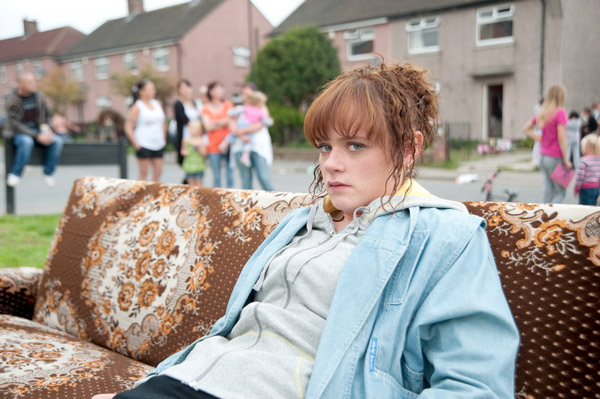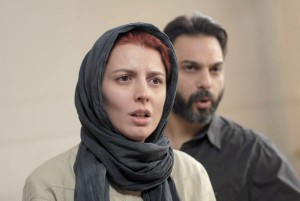
Natalie Gavin as The Girl in THE ARBOR (Photo: Nick Wall)
Go for broke—that could be the motto for many of this year’s noteworthy films. Terrence Malick created the world out of the Big Bang, all set to a pseudo-Wagnerian score, in The Tree of Life. Even Werner Herzog ventured back thousands of years to ponder life during the Ice Age—and in 3D, a format that has become a permanent fixture both at the multiplex and the art house. Melancholia’s Lars von Trier moved in the opposite direction with his twilight of mankind, accompanied by repeated blasts of the prelude and Liebestod (“Love Death”) from Tristan und Isolde, appropriate selections for impending annihilation. (Wagner was everywhere this year. Howard Shore may have written the score to A Dangerous Method, but you’ll remember the music from Siegfried.) Though this last pick may be the most divisive on the list, its opening prologue is the year’s most mesmerizing 10 minutes. And speaking of taking chances, a relatively unknown French filmmaker, Michel Hazanavicius, went back to the very basics, making a silent movie and reminding us of what we’ve been missing for the last 80 years.
Just as the scads of year-end awards have been generously scattered to The Descendants and the like, the selections of the 2011 top 10 are all over the place. Not by design, but the grandiose balances out with the intimate and sublimely subtle, a combination seen sometimes in the same film (see The Tree of Life). Better yet, half of the movies are already available on DVD, streaming video, or on-demand, a reminder that the best doesn’t necessarily arrive with the cold weather.
In the most audacious documentary released in 2011, The Arbor, maverick filmmaker Clio Barnard takes nonfiction film into a new realm. Purists beware: the entire film is a reenactment. Barnard cast actors to lip sync riveting interviews concerning the life and early death of British playwright Andrea Dunbar, who rose to fame at 18, and the toxic legacy she passed onto her eldest daughter. The film tacitly recognizes that any appearance before a camera for any occasion is a performance. You’re likely to watch the final credits to see who was an actor and who played themselves—it’s so impeccably cast. Tragic and disturbing, the film will get under your skin. A true oxymoron, it’s an exhilarating piece of British miserablism. Kent Turner (DVD, streaming video)

Jean Dujardin and Bérénice Bejo star in THE ARTIST (The Weinstein Company)
A movie star soars in the roaring 1920s, but is brought down by the talkies and tough times, only to be rescued by romance. Fans of old movies of course can’t help falling in love with the (mostly) silent film The Artist, and they’ll have a heck of a lot of fun picking out its many fond references to classic films. The grand orchestral accompaniment to the gorgeous black-and-white cinematography will transport anyone to the movie palaces of yore, and to the essence of cinema as a populist art form. A charming ensemble tugs on our hearts—the expressive (French) leads, Uggie the Russell Terrier, and the supporting players, whose well-known (American) voices are so distinctive that you think you hear them here. Afterwards you’ll come out of the theater with a big smile on your face. Nora Lee Mandel (in theaters)
The film debut by British comedian and BBC star Joe Cornish, Attack the Block, delightfully combines sci-fi and social commentary, like The Wire written by J.J. Abrams or Aliens made by Upton Sinclair. Due to Cornish’s willingness to play the space aliens vs. humans concept realistically, the audience takes his film and its themes seriously, but is still thrilled by the action and saddened when protagonists die. No deaths are frivolous. There’s no horror movie sense of schadenfreude as the aliens kill characters one by one. Of course, the whole thing might have been a wash if it wasn’t for the acting, and the movie transcends its genre because Cornish actually has something to say and doesn’t just settle for a live-action video game. Andrew Beckerman (DVD)
With Cave Of Forgotten Dreams, Werner Herzog successfully challenges the assumption that Darwinian evolution favors survival of only the physically fittest through natural selection. The French government allowed him to film, for the first time ever, the 32,000-year-old drawings in the depths of the Chauvet Cave through a very apt use of 3D under very restrictive physical and access conditions. His exploration of the astoundingly beautiful paintings of a dozen Ice Age animal species—lions, mammoths, and bears, oh my!—proves that while hunters were impressing the tribe on hunts outside during the day, it was the artists, who told their story inside during the long nights, who had the lasting impact. Beyond interviewing archaeologists, anthropologists, paleontologists, and other scientists whose multifaceted fascination for excavating and comprehending prehistory is infectious, Herzog imaginatively gets us inside the heads and hands of the ancient artists from many different angles, connecting them to the survival of the artistic instinct today. NLM (DVD, streaming video)
Both The Artist and Martin Scorsese’s latest film wholeheartedly celebrate the early days of cinema and the love of movies. Hugo, a dazzling film history class, will convert newcomers to the importance of film preservation through the aid of state-of-the-art 3D. It’s the best live-action family film in years. Based on Brian Selznick’s ground-breaking illustrated novel, a Parisian orphan boy unmasks the identity of a curmudgeon toymaker, who turns out to be the forgotten French pioneer filmmaker Georges Méliès. Hugo’s special effects are in complete service to the story. In fact, the most impressive visual tricks are the most rudimentary, which capture the seat-of-your pants trial and error filmmaking of the turn of the last century. What would Méliès do if he were alive today? He’d be diving into 3-D, too. KT (in theaters)
Melancholia throbs with pain and anguish, and, oddly enough, not from the fact that a giant planet is hurling toward Earth and spelling doom for everyone, but because its director feels it so. Lars von Trier has made no secret that he has suffered from depression, which led him to make Antichrist and this film. Here, he finds his footing again as a master of the dark and dreary as he follows two sisters, Justine (Kirsten Dunst) and Claire (Charlotte Gainsbourg), first at Justine’s fancy wedding, which doesn’t go well, mostly due to Justine’s crippling depression, and in the second half, where the usually calm Claire starts to freak out over that approaching big planet. “It doesn’t matter,” Justine remarks, “the Earth is evil, and no one will miss it.” You won’t exactly have a good time, yet for all of the gloom, there is both aching beauty—the opening images shot in super slow-motion set to Wagner—and very dark humor. And the performances all are stunning, as Dunst reveals layers of emotion never seen from her before, and Gainsbourg again delivers powerful emotions to match von Trier’s staggering demands. It’s tough and hard, but I couldn’t tear myself away. Jack Gattanella (in theaters, On-Demand)
You can’t stay the same all of your life according to the quietly sensuous and unassuming Octubre, the first film by Peruvian filmmakers Daniel and Diego Vega. A middle-aged robotic money lender, Clemente (the coolly-in-control Bruno Odar), is straddled with a baby girl he fathered with a prostitute who has skipped Lima. The outwardly religious Sofía (the sly Gabriela Velásquez) undertakes a stealth campaign, taking care of the crying baby, and with her sights set on Clemente. Released by the invaluable and resurfacing distributor New Yorker Films, this wry comedy has been inexplicably overlooked. It’s neo-neorealism with cheek. KT (DVD out in February 2012)
The French import Of Gods and Men chronicles the presumed real-life martyrdom of a group of monks at the hands of Islamic extremists in 1990s Algeria. It is, in a way, hagiography, but of a modern, humanistic sort. Much of the plot hinges on the monks’ decision to stay at the monastery and help serve the local impoverished village, even though it almost certainly means their death. It’s not perfect—too slack in its pacing, too squishy in its ideology. But no matter, director Xavier Beauvois has added several scenes to the stock of lasting world cinema. In a justly lauded scene near the end, the monks wordlessly eat an ad hoc last supper. It’s for keeps. Brendon Nafziger (DVD)

Leila Hatami & Peyman Moadi in A SEPARATION (The Film Society of Lincoln Center)
The shorthand descriptions that accompany Asghar Farhadi’s much-acclaimed film, A Separation, typically term it a courtroom drama, but actually the legal fight comes fairly late in the narrative. The core story, as the title implies, ostensibly concerns a trial separation between husband and wife—but upon reflection, it’s really about anxiety over a host of separations, both familial and existential. This theme, in turn, suggests the film’s rich, deeply interlocking subplots. Moreover, Farhadi pulls off the master storyteller’s trick of making everything feel “real” yet assuring us through the artful unfolding of events that he’s fully in control. It’s all structured for maximum tension. He’s aided considerably by both leads as well as the supporting cast—although in this case the word “supporting” seems to belittle their centrality. A Separation showcases ensemble acting in the best sense. Its beauty lies in how each character commands our intense interest, even our loyalties, at various times. As with a great work of literature, one comes away with an enlarged sense of what it means to be human. Peter Gutierrez (in theaters)
Five of the world’s top editors worked for years alongside Terrence Malick, who had reportedly conceived The Tree of Life decades earlier, from hundreds of miles of Emmanuel Lubezki’s brilliant 35mm images. The result is an extravagant effort to understand life on earth. The film’s enhanced by production designer Jack Fisk’s picture-perfect 1950’s home of an archetypical American male (played by Brad Pitt, one of today’s most adventurous movie stars), and gilded by the visual effects of the legendary Douglass Trumbull (pulled out of retirement). Maybe Malick has made better films, but he’s not made one so unguarded, and every moment of The Tree of Life could be from a child’s perspective. Equally mesmerizing are lava flows, boys’ stickball games, and family drama. Life is a chain of events with nebulous and shifting meanings, and Malick addresses his own fundamental questions. Were the moments from our lives a part of our personal memory or our collective memory? Is it possible to remember the moments we weren’t a part of? To ask these questions through cinema is a thing of beauty. Michael Lee (DVD)
Honorable mention must also go out to: Armadillo; Certified Copy; The Human Resource Manager; I’m Glad My Mother Is Alive; Nostalgia for the Light; Martha Marcy May Marlene; Poetry; Shut Up Little Man!; Tinker, Tailor, Soldier, Spy; and The Trip.
















Leave A Comment